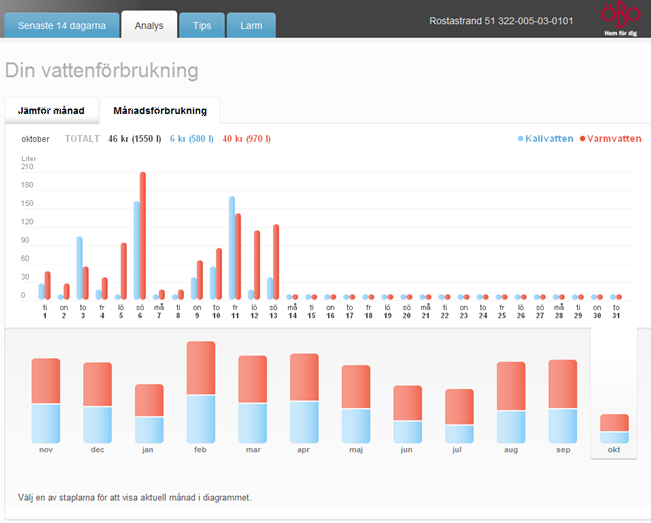Örebro¶
In Örebro (Sweden) several buildings in different areas of the city are pilot sites of the BECA project. In total, the pilot site covers 431 dwellings in buildings of varying site across the city.
Video – Savings – Service – Cost-Benefit – Exploitation – Partners
The BECA pilot site service includes a Energy Decision Support and Awareness Service (edss) to tenants on cold and hot water as well as a Energy Management Service (ems) of indoor temperature to optimise the heating system. Within the project, the existing systems of the houses are improved by raising the awareness for consumption through access to and visualization of consumption information. Tenants have access to their consumption data both through their invoices and via a web service. All measurement data are collected in a database, allowing a third party supplier to add new services such as visualization of consumption data via mobile phone.
Video¶
Savings¶
For more details visit the eeMeasure tool and the BECA deliverable D7.2 also covering qualitative surveys.
Service¶
edss¶
Before the BECA project, expenses for both hot and cold water consumption were included in the rent, it didn’t matter for people how much water they consumed. With edss all tenants have to pay for the water consumption in the dwelling. When the system started, all dwellings got a reduction of the rent level. The level of the reduction is based on an agreement with the Tenants Association. A large dwelling has a higher reduction than a small one. The total rent reduction for all dwellings is not the same amount of money as the cost for the water, before BECA. According to the agreement the reduction is based on the cost of a normal consumption of water, not the average. From the day when tenants got the reduction they also have to pay for their own consumption of both hot and cold water.
Every month tenants get their invoice where they are able to see their water consumption and the cost. If they want more information or if they would like to check the consumption in detail, they are able to use a web portal. At the web portal they can follow their consumption of water and find more information about how to save water and also get in contact with the housing company’s technician. The service makes it easier to save water and understand how much water they use every day.
ems¶
Heating costs are included in the rent. It is adjusted in the long-term according to changes in consumption and price of resources. The maximum inside temperature in all dwellings is set to a maximum level of 21 degrees Celsius in order to avoid tenants overheating their flats. The frequency of temperature measurements is set to 15 minutes. It is expected that this kind of service will allow for savings of 4 to 6 %. Before BECA and the ems service a lot dwellings were over heated because we didn´t know the indoor temperature. It can differ a lot from one dwelling to another and before BECA we had do make sure that the coldest dwelling got 21 degrees Celsius. With BECA we control all dwellings and make sure that they have 21 degrees Celsius, no overheating of dwellings.
Value propositions¶
The platform of the BECA solution is highly modular and flexible. Along with various communication channels the platform is also prepared to cover other resources and means (as it has been proven by the laundry extension). ÖrebroBostäder AB owns (and develops) the system ensuring long-term control and flexibility helpful in the housing sector. The solution is considered to be very stable and based on proven standard components. Using wires, batteries in the meters do not need to be changed and the equipment is long-lasting (est. 15 years). The web portal is considered to be user friendly, easy to navigate and requires little learning effort. Before BECA, tenants’ water consumption was included in the rent, hence, there was little immediate monetary incentive for the individual to reduce water consumption as the fixed fee was negotiated with Tenant Association based on the total consumption. BECA is one several trials in Sweden to implement metering and consumption based billing. The ems also ensures that heating consumption can be reduced for each dwelling without reducing the comfort. By controlling the overall temperature within dwellings (and the building) the total heating energy “tapped” from the district heating grid can be reduced. Ultimately, wastage can be avoided and the management can theoretically enable the district heating provider to supply more buildings without additional production.
Cost-Benefit¶
The path for socio-economic return is steeply increasing in the first years before flattening in the long run. As explained in the summary, the path for Tenants is dominated by suddenly paying for the consumption of water – different to the other pilot sites. Several monetary benefits for Tenants cannot be recorded such as avoided rent increases caused by continuously increasing consumption as well as reduction of consumption beyond reaching the “normal level”. The baseline scenario (Do-Nothing) is rather optimistic as no cost for (legally required) metering was included since the business model and equipment to be chosen by competitors is unknown. This is (in part) being compensated for by not recording the development costs (as the platform is also being used in other contexts and separating the costs was impossible). Since cost for metering is likely to be higher (also considering likely fees) the result for Social Housing is precautious.
Exploitation¶
ÖrebroBostäders management group and board have adopted the BECA-system, and it is now a standard in all new dwellings and refurbishments. In 2013, approximately 200 additional dwellings were equipped with the BECA. In 2014 over 300 additional dwellings are to be equipped. The ambition is to equip between 1,500 and 2,000 dwellings per year. ÖrebroBostäders is in touch with large housing companies in Sweden interested in the services implemented. Learning from the BECA experience we hope they will install the BECA service or parts of it. Additionally, elements of BECA are used to charge tenants for usage of laundry rooms which was included in the rent. One consequence is very high energy consumption for laundry. The system was tested and evaluated in almost 700 dwellings: Energy consumption decreased by 30% also reducing the cost for maintenance; most of the tenants appreciate the system while 10-15 percent do not. After discussion with the Tenants’ Association, the system will be introduced in two other areas in Örebro with a total of 2,200 dwellings in February 2014.
Partners¶
ÖrebroBostäder AB was founded in 1946 and now acts as the municipal housing company and largest landlord in Örebro. ÖrebroBostäder is pilot site manager in Örebro and co-operates locally with Örebro County Energy Agency and on the national level with the Swedish national Energy Authority and the public housing federation in Sweden, SABO.







